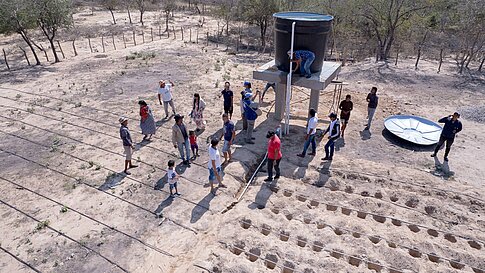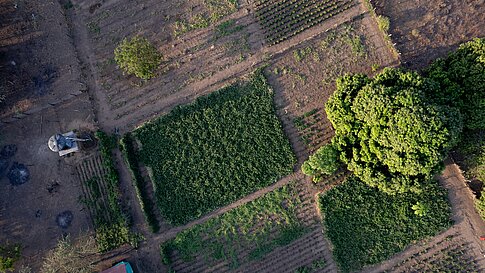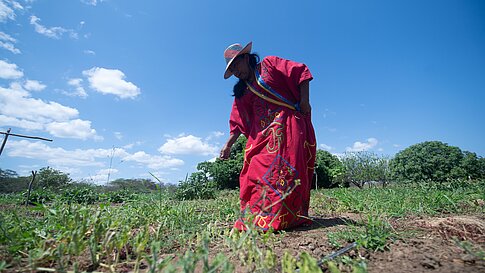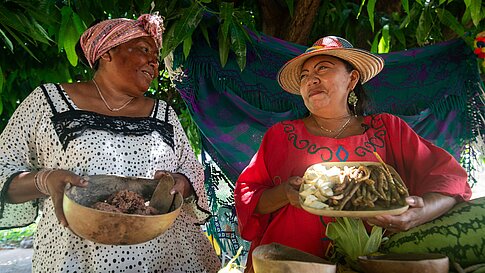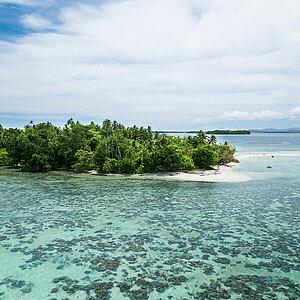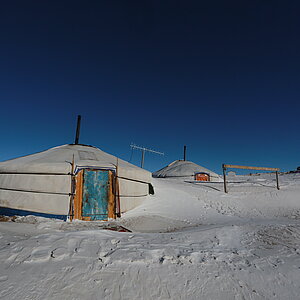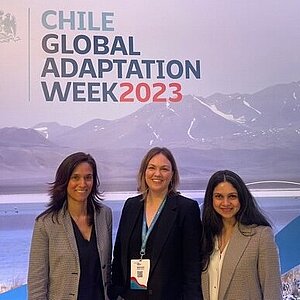Agrobiodiversity meets traditional knowledge to fight climate change in Colombia
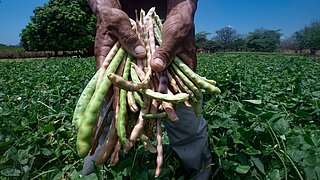
To further strengthen a community-based adaptation approach, the IKI-funded programme, Scaling Up Climate Ambition on Land Use and Agriculture through Nationally Determined Contributions and National Adaptation Plans (SCALA), is working to enhance the Wayuu’s resilience to increasingly extreme climatic conditions, incorporating traditional practices and emphasizing agrobiodiversity.
The Guajiro bean
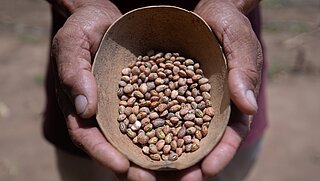
The Wayuu Indigenous Peoples have, for centuries, navigated the challenges of one the world’s most inhospitable climates. La Guajira, their ancestral homeland, stretches across the northernmost tip of mainland South America. This territory is renowned for being one of the harshest and most arid environments in the region with its relentless sun, strong winds, scarce rainfall and few water sources.
In the face of such adversity where food is not easy to grow, a key ally is a unique variety of cowpea, the kapeshuna bean, or better known as the Guajiro bean. This remarkable pulse, cultivated for countless generations and passed down through families like a cherished heirloom, is far more than just sustenance for the Wayuu whose population is currently over 600 000 people. It represents a profound connection to their ancestors, a symbol of resilience and a vital thread in the tapestry of their cultural and spiritual identity. The bean is remarkably adaptable: Not only is it resilient and capable of being eaten at any stage of its growth, but it is also satisfying and nutritious.
Ancestral resilience tested by climate change
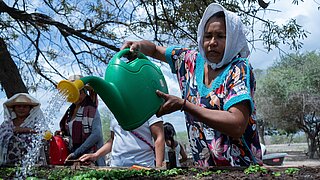
Traditionally, farmers aligned the cultivation of Guajiro beans with the predictable rhythm of rainy and dry seasons. This resilient way of life started to come to a halt more than two decades ago, and despite their remarkable resilience in overcoming challenges the Wayuu now face an unprecedented threat to their food security. The El Niño and la Niña events in recent years have further exacerbated food insecurity, with up to 67 percent of Indigenous Peoples in La Guajira experiencing it, according to government data.
The Ipasharrain village is one of over 50 villages that have benefited from the initiative of the Food and Agriculture Organization of the United Nations (FAO) and the United Nations Development Programme (UNDP). Utilizing a network of clean energy-powered pumps and drip irrigation, drawing water from a revitalized underground well, half an acre of the community's land is now dedicated exclusively to food production. Once at the mercy of a sky that could remain dry for nine months or longer, they now cultivate a thriving community field or "Centro Demostrativo Comunitario" (Community Demonstrative Centre).
At these Centres, FAO technicians collaborate with the community, adapting climate-smart agricultural practices to the cultural and social context. The technicians empower Indigenous Peoples to become the primary agents in the rehabilitation of their agricultural systems. For example, a cooking technician who speaks the Wayuu language and understands their culture and dietary practices, demonstrates how to prepare safe and nutritious meals, preserve ingredients for longer periods and incorporate new recipes and sustainable food practices. The Centres are also founded on recognizing and incorporating the ancestral knowledge of Indigenous Peoples, their historical production practices and consumption patterns into climate adaptation practices.
Marrying traditional knowledge and innovation through SCALA
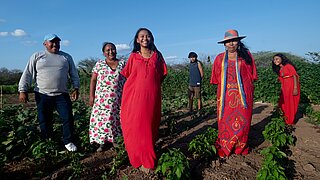
"We strive to foster a dialogue that bridges climate science and meteorology with the traditional knowledge these communities possess,” explains Jorge Gutiérrez, SCALA programme coordinator in Colombia. SCALA works on the issues of adapting to climate change’s current and anticipated effects with more than a dozen countries in Latin America, Africa and Asia. Along with several humanitarian partners, it helped optimize existing wells and create water reservoirs to enable micro-drip irrigation, using minimal water per day. "Another crucial aspect is agrobiodiversity. Recognizing the types of seeds, plants and food each community has is vital for climate change adaptation. We've identified several key foods, but one stands out: the Guajiro bean," the FAO expert explains.
In terms of soil management, the Wayuu, traditionally goat herders, now utilize goat manure mixed with minerals, ashes and hydro-retainers to enrich their soil and provide essential nutrients for crops and local seeds. This deep understanding of the nutrient cycle enable the community to have food available year-round, the expert highlights.
The project's impact has been so significant that, thanks to the new adaptative practices, some communities now even have a surplus of Guajiro beans to sell or trade. “When FAO is no longer here, we'll be confident that they have the entire cycle: nutrients, seeds, seedbeds, nurseries and water management over time, woven into their daily lives. This has been a significant but rewarding challenge, and we believe it can be replicated by other communities and countries, as these universal elements can be found in any community,” Jorge concludes.
Colombia, climate and agrobiodiversity
Colombia boasts a rich biodiversity. Climate change poses a significant threat to its fragile ecosystems, exacerbating land degradation and impacting water quality and agricultural production. Agriculture is particularly vulnerable to climate-induced events. Colombia has demonstrated its commitment to addressing climate change through ambitious mitigation and adaptation goals.
The SCALA programme in Colombia is also actively documenting and systematizing traditional knowledge for climate change adaptation across various regions. This initiative aims to capture 15 such practices across diverse regions. The ultimate goal is to integrate this valuable local knowledge into national action plans ensuring that climate adaptation strategies effectively incorporate the wisdom and practices of Indigenous Peoples and local communities. The cultivation of Guajiro beans by the Wayuu people is one of these initiatives.
A longer version of this article can be found on the FAO website.
The link has been copied to the clipboard
Contact
IKI Office
Zukunft – Umwelt – Gesellschaft (ZUG) gGmbH
Stresemannstraße 69-71
10963 Berlin



